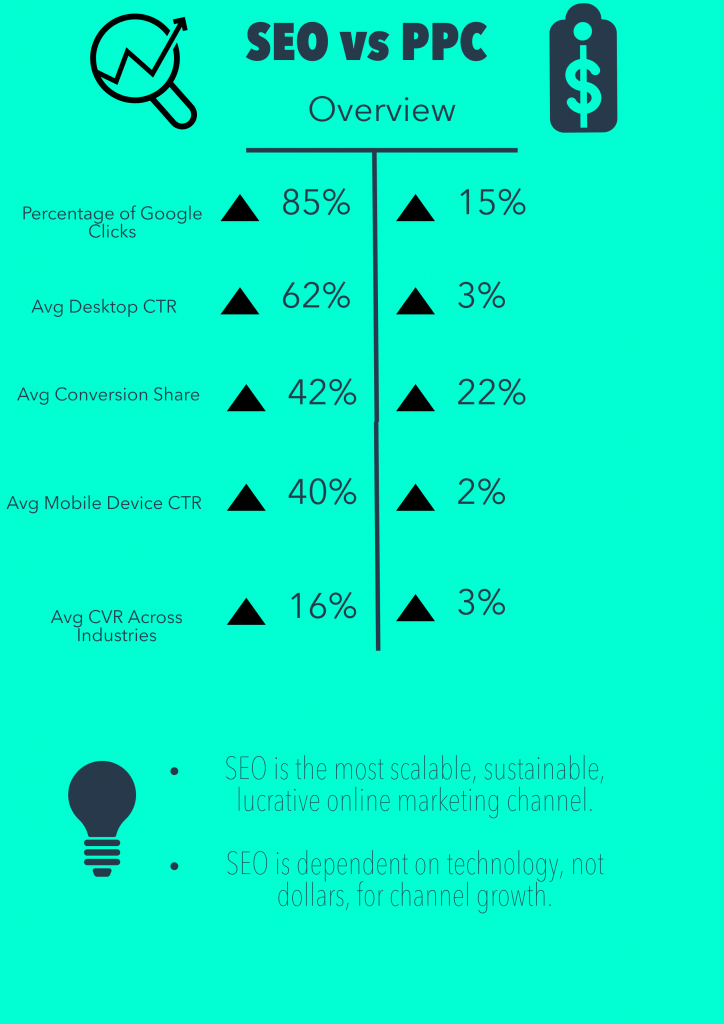SEO vs SEM
Understand the difference between SEO and SEM
Understand the difference between SEO and SEM
Search Engine Optimization (SEO) used to be considered a component of Search Engine Marketing (SEM). Now, they represent two distinct strategies, nested under the umbrella term “Search Marketing”, for optimal placement and visibility on search results pages (SERPs). Both SEO and SEM have the goal of increasing visibility, rankings, and lead generation for websites. The major difference is that SEM leverages the paid channel for acquisition, while SEO leverages the organic channel for acquisition.

SEM is the use of the paid channel to appear at the very top of the search results page. Running Google Ads is the most common strategy in this channel. Advertisers segment buyer personas based on demographic information, match those personas with target keywords, and pay for each time a user clicks on their associated ad on a search results page.
SEM showcases your link prominently at the very top of the SERPs, quickly drives hyper-targeted traffic to your site, and provides access to real-time feedback based on analytics.
However, organic links are far more likely to be clicked on than paid links and this strategy has an ongoing, rising cost per acquisition – if you stop spending, you stop growing. That’s because the cost of each new lead tends to rise as you exhaust the best segments and move down the line of less targeted audiences.
SEO optimizes a website from an on-page (content, keywords, metadata), off-page (backlinks, social engagement), and technical perspective (mobile-friendliness, site speed, structured data). These steps build credibility, satisfy the user and bot experiences, and help the site appear prominently among organic links on a search results page.
Brand awareness, domain authority, and trust are some of the most valuable benefits of an SEO strategy. Additionally, SEO tends to be the stronger long-term play in terms of generating sustainable, scalable revenue growth as the marginal cost per acquisition decreases.
However, SEO also requires significant investment from intellectual and technical perspectives updating and creating the best content, acquiring respectable links, and building a website optimized for the Search Bot and every stage of the customer journey.

The answer involves tradeoffs of time and money. If you have a relatively new website, uncertainty about the value of your target market, highly competitive keywords, low CPCs, or need results fast, SEM might be the best way to go. Alternatively, if you are certain about your target market’s value, can deal with a longer time horizon for results, have customers spending more time in each stage of the customer journey, have some domain authority, and your site is already somewhat optimized, SEO is best.

At Huckabuy, we are bullish on the value of SEO for businesses in every industry.
SEO is more scalable and sustainable than SEM in the long run when it comes to developing an audience, generating highly qualified leads, and driving revenue in the sales pipeline. This is because SEO a lower marginal cost per acquisition than SEM.
As more people visit and engage with the site, your ranking for your targeted keywords increase, you have more visibility in the SERPs, and even more new people visit the site to satisfy their queries. Unlike SEM, you are not paying for each new user that clicks into your site. They have been earned based on the credibility and trust you have built up to land a top position in the SERPs.
Most purchasing decisions begin with a search engine query, users are more likely to click on organic links than paid links, and almost no one evaluates any links beyond the first page. Given these factors and the nature and long-term reward of SEO, we advise our customers to invest heavily in this channel.
A: The organic search channel is defined as the users who visit your website via a search engine by clicking on an unpaid link. The size and consistency of this traffic is dependent on search engine optimization (SEO) of your website to ensure that the content you create addresses and solves the queries of your target audience.
A: The paid search channel is defined as the users who visit your website by clicking an advertised link on the results page of a search engine. The size and consistency of traffic from this channel are dependent on a “pay to play” model where your visibility is tied to your ad spend and ability to outbid competitors for real estate on results pages for target keywords.
A: There are a number of reasons related to scalability, sustainability, and ROI for why you should invest more in the organic search channel. Studies show the vast majority of searchers completely bypass paid ads in favor of organic results, they are far more likely to click through to organic results, and organic results have a far larger average share of conversions. If you continue to publish quality material, release new products, or expand services desired by your target market, you are effectively generating new website content that can garner quality backlinks and be keyword optimized for further visibility in the organic channel. By contrast, the paid search channel requires investing more and more money for less quality visibility, based on what research shows about searcher behavior.
A: Amazon, Apple, eBay, Overstock all built their brands through the organic search channel. The list goes on. It goes to show that organic search is the most scalable online marketing channel out there. If your business gets it right, the sky is the limit for growth.